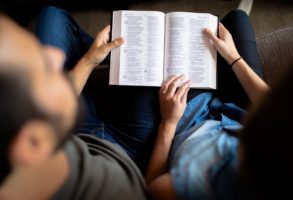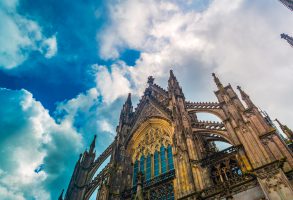Published April 15, 2011
The National Catholic Register
As pilgrims converge on Rome for the beatification of Pope John Paul, Weigel is in the Eternal City, sharing his expertise on the third-longest papacy in the history of the Church with audiences at a host of venues, including the Pontifical North American College, the Irish College, the Polish Institute of Rome and Domus Guadalupe. He will be working with NBC during the beatification.
In an interview with National Catholic Register senior editor Joan Frawley Desmond, he shares his perspective on Blessed John Paul II and why calls for canonization at the Pope’s funeral six years ago — “Santo Subito!” — are being answered.
Why is Pope John Paul II being beatified?
Because the official judgment of the Church has caught up with the spontaneous judgment of the people of the Church at John Paul II’s funeral: that this was a saintly life that should be recognized publicly as such.
What is the essence of his holiness?
Radical discipleship. Everything Karol Wojtyla did — as priest, poet, philosopher, playwright, bishop, father of Vatican II, Pope and world statesman — was an expression of his discipleship.
Do many Catholics, and perhaps the world at large, confuse his celebrity and charismatic personality with actual holiness?
I don’t think his personality was very “charismatic” in the last five or six years of his life, when he was crippled by illness. And yet the sanctity came into focus through the broken vessel, perhaps more clearly than ever.
The Church offers different reasons for beatification. For example, St. Maximilian Kolbe was declared “a martyr of charity.” Imprisoned at a Nazi death camp, Kolbe laid down his own life to save the life of another man. How would you crystallize Pope John Paul II’s singular Christian witness during the era in which he lived?
By his teaching and his manner of life, he made the Christian proposal interesting and compelling in a world that imagined it had outgrown the “need” for religious faith.
What was the Church like when he was elected Pope? What was the world like?
The Church was a mess, and the world seemed permanently divided into two hostile camps.
Twenty-six years later, the possibility of freedom had been restored in Central and Eastern Europe, and the Church had been given the materials with which to realize the great potential of Vatican II.
That potential hasn’t been completely realized, obviously, but now we have a chance that didn’t exist in 1978.
How did he reinvigorate the papacy?
By returning it to its biblical roots as an office of evangelical witness, in which Peter, following the Lord’s injunction in Luke 22:32, strengthens his brethren in their faith, hope and love.
What did he do to advance the Gospel, to guide the Church into holiness, and to reach those who don’t care about religion at all?
As I said above, he made the Christian proposal interesting, and he made religious conviction seem relevant in a world of secular cynicism. In fact, that may have been his greatest personal witness: the witness of faith in the human possibility, informed by faith in God, in a world where sensibilities had become dulled by cynicism.
The beatification of this Pope has been described as the “fastest process on record.” Critics have argued that the process actually has been too rapid. What are the dangers of a high-speed beatification, and are there past instances when the Church had to backtrack? What has been the Vatican’s response to the critics’ concerns, and have all their issues been fully addressed? In particular, critics have been concerned about John Paul’s slow response to the U.S. clergy abuse crisis.
To my knowledge, the process has been a thorough one. There are four massive volumes in the positio, the official record of the process. I discuss the Pope’s response to the abuse crisis in the second volume of my biography of the Pope, The End and the Beginning, and if people want to re-explore that episode, they can find the story there. John Paul II was a great reformer of the priesthood, and any serious judgment on his handling of the abuse crisis has to be put into that context.
Did the Pope ever speak to you about calls for his beatification? If so, explain. If not, knowing him as you do, what would be his likely response?
No, he didn’t; after all, he was alive at the time. He was thankful for the graces that had shaped his life, and I expect that would be his response today.
Pope John Paul II canonized more saints than any pontiff. Why?
Because he was convinced that sanctity is all around us; that God is profligate in his grace and in his saint-making; and that the Church should recognize this, so that it always has fresh models of sanctity and heroic virtue.
What will follow the beatification process? Any possible hurdles? Is there a timeline for canonization?
I don’t know of any timeline. But I don’t expect things to suddenly stall out, either. I think it would be a fine thing if God would arrange it such that John Paul II and Mother Teresa were canonized together.
George Weigel is Distinguished Senior Fellow of the Ethics and Public Policy Center in Washington, D.C. and holds EPPC’s William E. Simon Chair in Catholic Studies.



